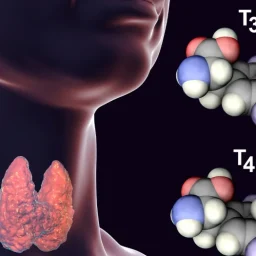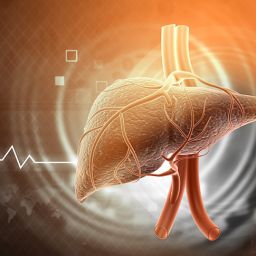
The Thyroid Gland and Its Role in Body Function
Before we dive into how thyroid issues impact the heart, it’s essential to understand how the thyroid works. The thyroid produces two primary hormones: Thyroxine (T4) and Triiodothyronine (T3). These hormones regulate metabolic processes by influencing the speed at which the body’s cells use energy. This affects everything from body temperature to heart function.
Thyroid hormones also interact with the heart in several important ways, including controlling the heart rate, blood pressure, and the force of heart contractions. A healthy thyroid ensures that these functions operate smoothly, while an imbalance in thyroid hormone levels can lead to a range of cardiovascular problems.
Understanding Thyroid Disorders and Their Impact on Heart Health
Thyroid disorders are typically divided into two main categories:

- Hypothyroidism – A condition in which the thyroid does not produce enough thyroid hormones. This results in a slowdown of body functions and can have a significant effect on heart health.
- Hyperthyroidism – A condition in which the thyroid produces too much thyroid hormone. This speeds up the body’s processes and can lead to a number of heart-related complications.
Each of these disorders affects the heart differently, so it’s essential to understand the specific risks and symptoms associated with each.
Hypothyroidism and Its Impact on Heart Health
Hypothyroidism is a condition where the thyroid is underactive, meaning it does not produce enough thyroid hormones. As a result, metabolic processes slow down, and various bodily functions are affected.
1. Slower Heart Rate (Bradycardia)
One of the most noticeable effects of hypothyroidism on the heart is a slower heart rate, known as bradycardia. Thyroid hormones are critical in regulating the electrical impulses that control the heart’s rhythm. With insufficient thyroid hormones, the heart rate decreases, often leading to fatigue, dizziness, and exercise intolerance. A very slow heart rate can be dangerous and, in extreme cases, can lead to heart failure.
2. Increased Risk of High Cholesterol and Atherosclerosis
Hypothyroidism can also cause an increase in blood cholesterol levels. This happens because thyroid hormones help regulate the metabolism of fats. When thyroid hormone levels are low, lipid metabolism is disrupted, leading to high levels of low-density lipoprotein (LDL), or “bad cholesterol.” High cholesterol, in turn, contributes to the buildup of plaque in the arteries, a condition known as atherosclerosis, which increases the risk of heart attack and stroke.
3. Increased Blood Pressure (Hypertension)
In addition to bradycardia, hypothyroidism can also lead to an increase in blood pressure. The connection between low thyroid hormone levels and high blood pressure isn’t fully understood, but it is believed that hypothyroidism can impair the ability of blood vessels to relax, leading to increased resistance and higher blood pressure.
4. Risk of Heart Failure
Chronic hypothyroidism, if left untreated, can eventually lead to heart failure. This occurs because a low metabolic rate and poor circulation cause the heart to work harder to pump blood throughout the body. Over time, the heart muscle becomes weaker, reducing its ability to pump blood efficiently, which can ultimately result in congestive heart failure.
Hyperthyroidism and Its Impact on Heart Health
Hyperthyroidism occurs when the thyroid produces excessive amounts of thyroid hormones. This condition speeds up the body’s processes, including the heart’s activity. The effects of hyperthyroidism on the cardiovascular system are often more immediate and can lead to serious complications.
1. Rapid Heart Rate (Tachycardia)
One of the most common symptoms of hyperthyroidism is an abnormally high heart rate, or tachycardia. This occurs because excess thyroid hormones cause the heart to beat faster and stronger. In some cases, the heart rate can exceed 100 beats per minute (bpm), even at rest. This rapid heart rate increases the workload on the heart and can lead to symptoms such as palpitations, shortness of breath, dizziness, and fainting.
2. Increased Risk of Atrial Fibrillation (AFib)
Hyperthyroidism is strongly linked to the development of atrial fibrillation (AFib), a type of irregular heartbeat. AFib occurs when the electrical signals in the heart become chaotic, causing the heart’s upper chambers (the atria) to quiver instead of contracting normally. This leads to poor blood flow and can increase the risk of stroke. Hyperthyroidism can trigger or worsen AFib by overstimulating the heart and causing abnormal electrical activity.
3. Increased Risk of Heart Failure
In addition to causing tachycardia and AFib, hyperthyroidism can also increase the risk of heart failure. The combination of a rapid heart rate, increased blood pressure, and the higher demand placed on the heart can eventually lead to heart failure. If left untreated, this can progress to congestive heart failure, where the heart is unable to meet the body’s needs for oxygen and nutrients.
4. High Blood Pressure (Hypertension)
Like hypothyroidism, hyperthyroidism can also affect blood pressure. However, in the case of hyperthyroidism, high blood pressure typically results from the heart beating too quickly and too forcefully. This condition can further strain the cardiovascular system, leading to an increased risk of complications such as stroke, heart attack, and kidney disease.
How Thyroid Health Affects the Vascular System
Thyroid hormones do not only impact the heart but also have a direct influence on the vascular system, which refers to the network of blood vessels that transport blood throughout the body. Both hypothyroidism and hyperthyroidism can cause changes in vascular function that affect blood flow, pressure, and overall cardiovascular health.

1. Vascular Resistance
In hypothyroidism, there is an increase in vascular resistance, which means the blood vessels become stiffer and more constricted. This reduces blood flow and increases the workload on the heart. In contrast, hyperthyroidism can cause the blood vessels to dilate, leading to lower vascular resistance but putting additional strain on the heart to pump blood through the expanded vessels.
2. Endothelial Dysfunction
Thyroid hormones also influence the function of the endothelium, the thin layer of cells lining the blood vessels. Both hypothyroidism and hyperthyroidism can lead to endothelial dysfunction, which contributes to an increased risk of atherosclerosis, heart attack, and stroke. Endothelial dysfunction impairs the ability of blood vessels to dilate properly, restricting blood flow and increasing the risk of cardiovascular events.
Thyroid Health and Cardiovascular Risk Factors
Thyroid disorders can influence several important cardiovascular risk factors, including:
- Cholesterol Levels: Both hypothyroidism and hyperthyroidism can alter lipid metabolism, leading to unhealthy cholesterol levels that increase the risk of cardiovascular disease.
- Blood Pressure: Hypothyroidism can contribute to high blood pressure, while hyperthyroidism may lead to low or fluctuating blood pressure.
- Heart Rate: Thyroid hormones directly affect the heart rate. An imbalance can lead to tachycardia (fast heart rate) or bradycardia (slow heart rate), which can strain the heart.
Key Considerations for Maintaining Both Thyroid and Heart Health
To maintain optimal thyroid and heart health, it’s essential to:
- Monitor Thyroid Function Regularly: Regular check-ups and thyroid function tests can help identify thyroid imbalances early, allowing for timely treatment and reducing the risk of heart-related complications.
- Adopt a Heart-Healthy Lifestyle: This includes a balanced diet, regular exercise, maintaining a healthy weight, and avoiding smoking or excessive alcohol use. These habits benefit both the thyroid and cardiovascular systems.
- Manage Stress: Chronic stress can negatively impact both thyroid function and heart health. Practicing stress management techniques such as meditation, yoga, or deep breathing exercises can help reduce the impact of stress on both systems.
- Treat Underlying Health Conditions: If you have other health conditions, such as diabetes, hypertension, or high cholesterol, it is crucial to manage them effectively, as they can compound the impact of thyroid imbalances on your heart.
Thyroid health is crucial for maintaining a healthy heart. Both hypothyroidism and hyperthyroidism can have significant effects on the cardiovascular system, from altering heart rate and blood pressure to increasing the risk of heart disease and stroke. By understanding the connection between thyroid and heart health, you can take proactive steps to maintain a healthy thyroid and reduce your risk of cardiovascular complications. Regular monitoring, a healthy lifestyle, and effective management of thyroid disorders can help ensure that both your thyroid and heart stay healthy for years to come.















